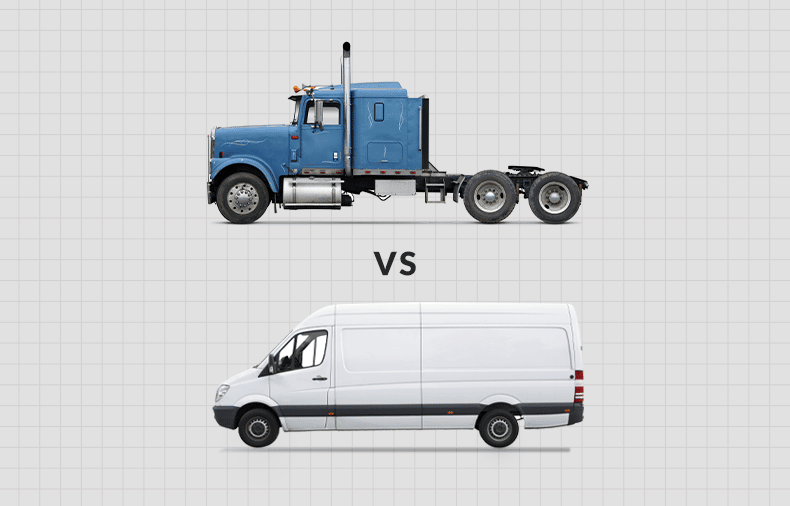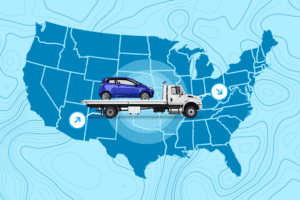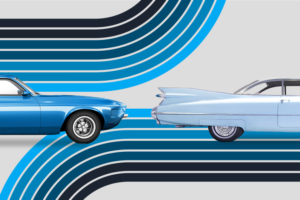Dropping spot market rates and insane fuel costs have put traditional Class 8 big rig owner-operators in the crosshairs as the odd man or woman out in today’s highly volatile freight market.
As a result, industry professionals are indicating one option for owner-operators might possibly be to exit the industry entirely as they simply won’t be able to weather these two conditions without going out of business. It’s simply unsustainable. One owner-operator told Business Insider it was costing him $20,000 a week to keep his three trucks running.
Five other truckers told Insider that the industry could be at a breaking point and that they’ve had to get creative in recent months to turn a profit while spending thousands at the pump.
Plus, many owner-operators likely over-invested in new or used equipment during the pandemic to take advantage of a hot freight market that had no end in sight – and that was a good idea at the time.
But conditions have changed.
Relatively speaking, the red-hot e-commerce market has dipped, and consumers are spending more on experiences and travel after being pent up for so long during lockdowns.
What’s the Alternative?
Here at uShip, we see another option for traditional big rig owner-operators: Downsize.
Instead of owner-operators leaving the industry entirely, sacrificing years of over-the-road experience, not to mention having to find another career and livelihood, we’re suggesting getting behind the wheel of a sprinter van, box truck, or pickup with a trailer.
Think of it as going from a 5BR/4BA McMansion to a 2BR/2BA condo in a gated community. It’s way more manageable.
Expense Math Is Sexy
Downsizing doesn’t feel like traditional trucking to you? Perhaps not. A box truck or cargo van doesn’t carry the same vibrato, machismo, and sexiness of a high-polish, out-my-way-four-wheeler big rig. Take a look at our cost-to-ship page to see for yourself.
But what IS sexy is dropping your expenses in half – down from $1.50/mile in a Class 8 tractor-trailer to $.75-.$80/mile in a smaller vehicle. The chart spells out the significant difference.
Consider this:
In a smaller footprint vehicle, you’ll (likely) run on gas, not diesel. You’ll drive fewer miles. Tires, repairs, and maintenance are significantly less costly – and parts more available. Insurance premiums are far lower. And capital expenses, like loan payments on vehicles that have a lower cost basis, are far less as well.
Industry data shows Class 8’s get 6.5 mpg while the top-performing sprinter van gets over 25 mpg. Even if that van is fully loaded with furniture and pulling 20 mpg, that’s still 3x what you’re getting in your 2001 Freightliner.
And God forbid an accident occurs. Even if it’s not your fault, the deductible is a completely unexpected hit that dips into whatever reserves you have.
Then there are the intangible benefits. More home time. Easier parking. Total schedule flexibility. No more grouchy forklift drivers or over-caffeinated dispatchers.
Your Own Marketing & Sales Team
Transport marketplaces like uShip spend a considerable amount of time and money to source new business and shipments – things like furniture, cars, boats, motorcycles, equipment, and more. And unlike load boards with phantom loads, uShip has real stuff. And in some parts of the business, you can become part of a private carrier network for high-volume customers.
As uShip CEO said, “uShip is grab-and-go freight, not hunt-and-peck freight.”
Given uShip’s commitment to supplying a constant supply of new shipments, the platform comes with booking fees that run about 15% of the total shipping cost. That percentage was dramatically reduced across all categories in late 2020, while pricing estimates were raised by 12.5% in early 2022.
Ultimately, uShip doesn’t get paid unless you get paid. It also comes with all sorts of valuable tools, tracking, and promotion that you don’t need to do yourself. Think of uShip as your marketing and sales division.
What You Need To Know
To be clear: downsizing isn’t for everyone.
It requires lifting, working directly with customers, and receiving a customer feedback rating after each delivery. You’re competing against other transporters like you so you need to be a bit savvy. It takes a bit of time and elbow grease to build a feedback score.
Another word on your customers:
unlike the traditional freight world, where pallets are shrink-wrapped and palletized, items on uShip often need to be blanket wrapped or secured. These items can be a family heirloom from Aunt Sally or a high-end piece bought on an e-commerce site. In other words, these items matter to the parties involved – and they expect you as the transporter to care as well.
Of course, the next natural question is:
“Well, sure the expenses are less, but aren’t I hauling a lot less freight in a pickup truck with a 15-foot trailer?” The shorter answer is yes. But it’s all relative. It’s a different strategy. It’s a volume game. Establish a regular route. Find an anchor shipment, say, a sofa and two chairs. Then you fill in around it with various items that let you ride topped off.
And making this shift will likely require a transfer of authority given the change of equipment, goods shipped, and region covered.
‘Being my own Boss’
Transporters who have made the jump from a big rig to a small vehicle – and had the entrepreneurial spirit and patience to build a positive reputation – now reportedly make more than they ever did driving a Class 8. And based on a survey of transporters on uShip, 52% say their favorite thing about being on uShip is “being my own boss.” Another 20% love financial flexibility.
So how much can established transporters on uShip make?
In May 2022, nearly 20 transporters earned over $20,000 in gross income on uShip, while 54 earned over $10,000 gross. The top-earning transporter grossed $60,000 on hundreds of shipments. Most shipments on uShip travel 800-1000 miles.
As a business, uShip did $200 million in gross shipping volume last year.
Where Do Shipments Come From?
Curious about what kinds of customers use uShip? Customers are both businesses and consumers. Our partners are companies like eBay, Etsy, Chairish, 1stDibs, Ritchie Bros., Vibe Kayaks, as well as 1000s of SMBs, that tap into capacity on our marketplace. We also have a lot of consumer enthusiasts – think motorcycle refurbishers, car collectors, and boat owners. One of our biggest categories is furniture and household goods.
As you can tell from the customers above, freight types flowing through uShip vary widely. So having the right equipment is essential. In other words, a Ford Transit Connect cargo van, bidding on or booking vehicle shipments isn’t practical. Your wheelhouse will be furniture, antiques, sofas, and the odd vintage item. If you drive a pickup and open trailer, motorcycles, ATVs, golf carts, and some cars might be your specialty.
Conclusion
The industry and world are changing so fast. When you’re the odd person out, it sometimes requires expanding your perception of what you’ve known. There is an opportunity to make some good money here.




